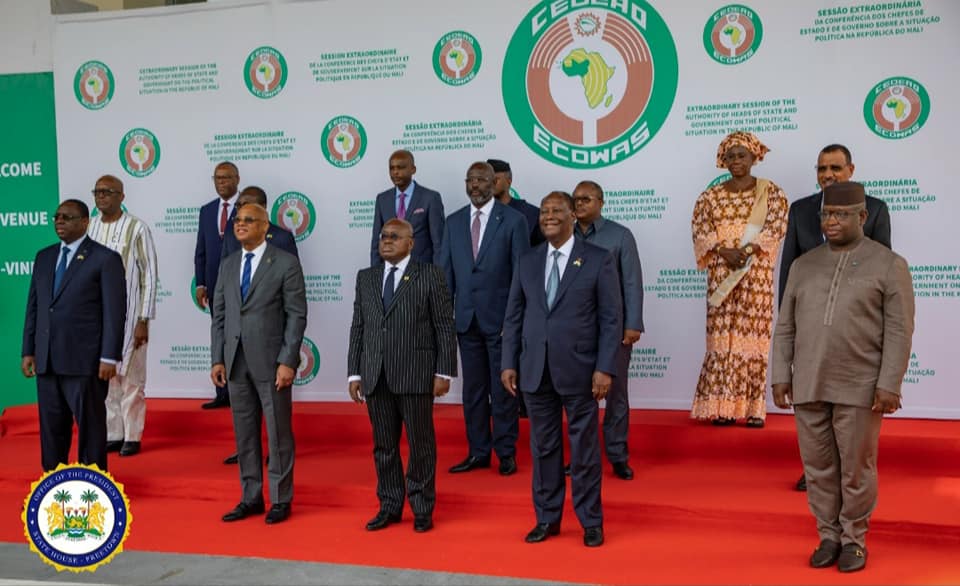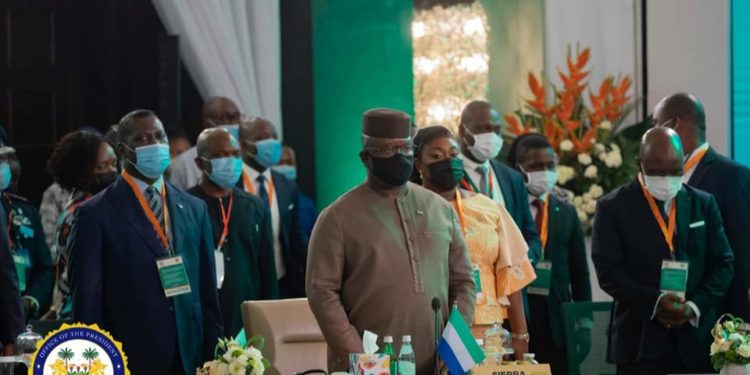Sierra Leone’s President Julius Maada made a sublte appeal on behalf of the Malian junta at the just concluded ECOWAS summit in Ghana, calling for dialogue to pave way for agreement on a more practicable timeframe for transition to civilian rule.
Bio, according to a news release from the presidency, argued that while ECOWAS had a reason to take action against the junta, the subregional bloc should also consider the condition under which it operates which couldn’t have allowed it to meet the bloc’s deadline.
“On numerous occasions, the ECOWAS Authority of Heads of State has called on Mali to return the country to constitutional order by February 2022. But it is also clear to all of us, that the Transitional Leadership of the Malian junta is unable to do so based on communications submitted to the Chair of Authority,” Bio was quoted by the State House Communications Unit.
He added: “While we could argue that electoral politics is possible even in the midst of a violent insurgency, we must first agree on what ecosystem should exist within which credible elections can happen.”
According to Bio, in agreeing to a time frame for the Malian junta to fully comply with ECOWAS dicta, the bloc shouldbe mindful of the “unique complexities of the Malian crisis.”
Bio’s speech at the extraordinary ECOWAS summit in the Ghanaian capital Accra on Sunday matched his longheld view on the political crises in Mali and Guinea, which favours dialogue with the two countries’ militaries.
The Accra summit brought together 11 heads of state and government of ECOWAS. It was summoned after the junta presented its proposed transition plan asking for five years to hand over power to a democratically elected government, which defies the plan of ECOWAS which had envisaged a new civilian administration by February 27, 2022.
The junta’s plan means it will remain in office until the end of 2026. it argues that it wants to implement crucial reforms that will ensure the conduct of credible elections and peaceful transfer of power.
In their communique the ECOWAS leaders said the five-year proposal by the junta is “totally unacceptable.”
“This calendar simply means that an illegitimate military transition Government will take the Malian people hostage during the next five years,” it says.
While it resolved to maintain initial sanctions already imposed targetting individual members of the junta and their family members, the bloc imposed additional economic and financial sanctions, which include severing diplomatic ties with Mali by all ECOWAS member countries, closing land and air borders with it and suspend all commercial and financial transactions with it, with the exception of food products and other essential commodities like medications. ECOWAS also ordered the freezing of assets of Mali in all ECOWAS institutions.
The coups in Mali and Guinea exposed a major challenge facing ECOWAS in terms of defending its own democratic principles.

Both the Mali and Guinea coups were attributed to poor governnance and the controversial practice of constitutional amendment to extend presidential term, which many political pundits have blamed for the reverse in democratic gains realized on the continent in the mid-90s.
But ECOWAS appears determined to use the two situations to establish its abhorence for unconstitutional order. While at it, it has also put in motion actions to review its protocol on democracy and good governance, with the goal of puting in check the powers of incumbent leaders.
President Bio spoke on this in his Accra summit address, reiterating his support for the draft revised protocol.
“Sierra Leone believes that the two-term limit must be included in the national constitutions of all Member States,” he said.
He stressed that while the five-year transition period proposed by the Malian junta was excessive, especially in view of the fact that they had been in power for over 18 months now, the important thing to focus on now is to seek solution to the disagreement.
“Without a doubt, Mali has violated the ECOWAS Protocol on Democracy and Good Governance of 2001 by toppling the government of former President Ibrahim Boubacar Keita in 2020. It was an unconstitutional act…but…the issue before us today is what to do collectively to ensure that Mali complies with the ECOWAS norms on democracy and good governance and within the shortest possible timeline,” he said.






















